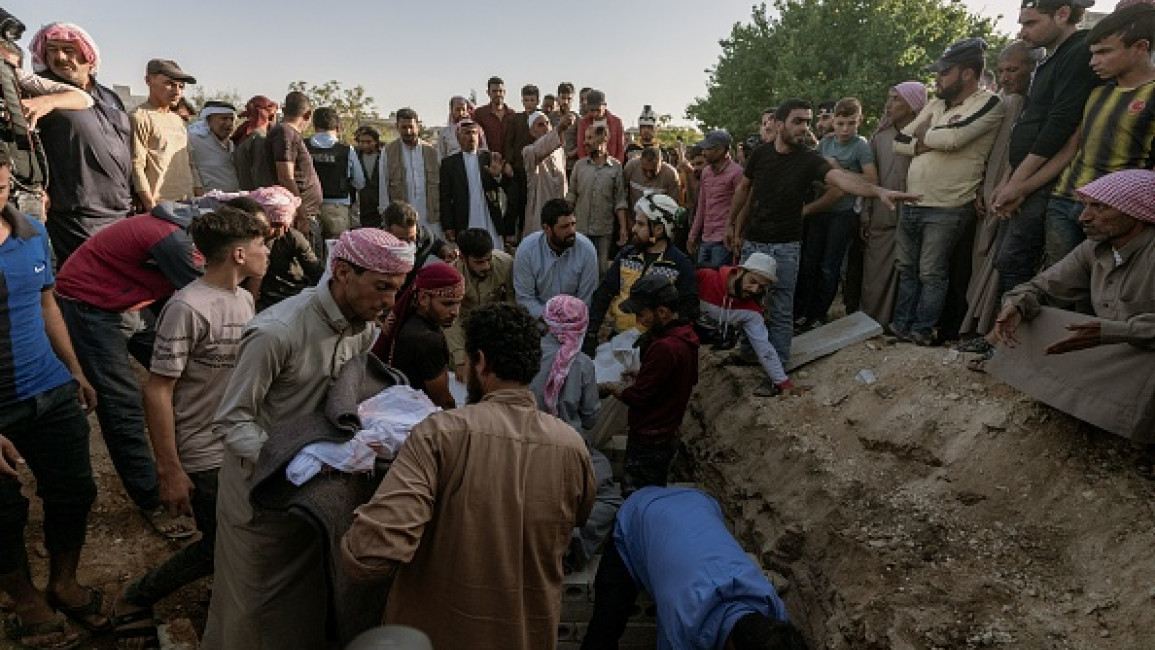Fighting in Syria has hit 'four year peak': UN
The fighting in Syria is at its worst point in the last four years, the head of the UN Commission of Inquiry on Syria (COI) said on Tuesday, 24 October, as the bombing has struck three different parts of the country over the last month.
"We are witnessing the largest escalation of hostilities in Syria in four years. Yet again, there appears to be a total disregard for civilians' lives," Paulo Pinheiro, the chair of the COI, told the UN General Assembly.
Pinheiro's statement came as the Syrian regime has carried out a punishing bombing campaign on rebel-held northwest Syria for the past three weeks, leaving at least 200 civilians killed and injured.
The regime has shelled hospitals, mosques and schools in what it says is retaliation for an attack on a regime-military academy in Homs on 5 October, which killed more than 100.
No one has claimed responsibility for the attack, but the regime has blamed former al-Qaeda affiliate Hayat Tahrir al-Sham (HTS), which controls the northwest.
In the country's northeast, Turkey launched extensive airstrikes in the region controlled by the Kurdish-led Syrian Democratic Forces (SDF).
Turkey commenced the attack after accusing the Kurdistan Workers' Party (PKK) of carrying out a bombing of a government building in Ankara, which injured two Turkish soldiers.
As a result of the Turkish attacks, at least 18 civilians were killed and "major damage and destruction" was sustained by critical civilian infrastructure, according to a report by the northeast Syria NGO forum.
"The scale of damage far supersedes the capacity of the humanitarian community to sustain emergency life-saving service provision," the NGO Forum said on 16 October.
'Fatal and horrific' injuries in northwest Syria
Though the Syrian regime at first said it was targeting northwest Syria in response to the attack on the Homs military academy, it has since justified its continued assault as a retaliation against Israel.
Commenting on Israeli strikes on the Damascus airport, a Syrian military source said the strike was "part of the approach in supporting the terrorist groups that the Syrian Arab Army is fighting in the north of the country, which constitutes an armed arm of the Israeli entity."
The source added that "the Syrian Arab Army will continue to pursue and strike the [terrorist groups] until the country is cleansed of them."
The toll of the regime's bombing campaign has been borne by civilians, with a single strike on a displacement camp in northwest Syria killing five civilians, including three women and two children, on Monday.
"As soon as people started to move in the streets, shells fell on the city. Unlike every other time, [Syrian President] Assad wants to kill more people. He doesn't want to destroy buildings," Mahmoud Mosa, an activist in Idlib, told The New Arab.
Though the Syrian regime and Russia have bombed northwest Syria consistently since at least 2018, doctors and civil defence workers described the latest aerial campaign as particularly brutal.
"The injuries were fatal and horrific; the injuries led to the amputation of limbs, the gouging out of eyes, and panic attacks among women, children and even men," Dr. Mohammed al-Abrash, a doctor who works in Idlib, told TNA.
At least three hospitals were struck by the regime, in addition to other civilian infrastructure and markets where people tend to gather.
"What's different this time is the fact there's no safe place in Syria. The shelling is becoming very random. There's no predictability when the next bomb or next attack is going to happen," Dr. Mufaddal Hamadeh, the president of the Syrian American Medical Society, told TNA.
Hamadeh added that SAMS-supported clinics had temporarily suspended outpatient and elective procedures to prevent "gatherings of people" in fear that it would attract further shelling.
In addition to civilian casualties, the prolonged bombing campaign in the northwest has stretched the capacity of the medical staff on the ground, many of whom have had to work gruelling 24-hour shifts.
"Many of us lost our homes, our possessions and even members of our family. This causes severe psychological pain that is reflected in our behaviour, work performance and our relationships," al-Abrash said.
He added that the feelings of psychological stress and pain return each time the bombing is renewed.
The UN has consistently called for a nationwide ceasefire in Syria, but these calls have gone unheeded.



